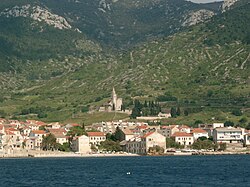Komiža

Komiža (Italian: Comisa) is a town and harbour on the western coast of the island of Vis in the Adriatic sea; population 2,476.
Komiža is located at the foot of the Hum hill (587 m). An average air temperature in January is 8.9 °C. Economy is based on farming, winemaking, fishing and fish processing, seafaring and in recent times on tourism. On the eastern coast of the bay are large sand and pebble beaches (Kamenica, Gusarica, Nova Posta, Velo Zalo).
Komiža has the regional road that connects Komiža with the town of Vis, the only town being connected with Split.
General information
Situated in a deep bay, whose eastern coast abounds with large pebble beaches (Kamenica, Gusarica, Nova Posta, Velo Zalo), Komiža offers excellent visitor opportunities: quality accommodation facilities - hotel, apartments, and a number of cultural and historic sites - monastery, fortresses. It is famous for its fishermen (fishermen from Komiza are also known in San Pedro, California), so that fish and other seafood are traditionally served daily. Famous are also Komiza wines and carobs.
Sports and recreational facilities include three boccia courts, as well as various playgrounds for basketball, handball and football. Water sports and diving (during the diving season) are also very interesting.
The special atmosphere of summer evenings is supplemented by performances of harmony-singing groups or children's choirs on the coastal promenade or in one of local restaurants. Exhibitions and other cultural events are regularly organized, especially when the Croats from the United States of America, actually Komiza natives, visit their mother country.
Heritage
The settlement was first mentioned in the 12th century. The citadel (kastel) in the port was built in 1585.
In the 13th century, the Benedictines founded the monastery of St. Nicholas, so-called Muster on an elevation above the settlement. The oldest core of the monastery is a one-nave Romanesque church with a semicircular apse from the 13th century.
In the period of the 14th-17th century a large five-nave church was built: its central nave dates back to the beginning of the 16th century and the large Baroque sanctuary to 1652. Two high square towers in Romanesque style have been preserved of the original monastery fortifications; the tower above the church front was converted into a bell tower in 1770.
The church of Our Lady of Gusarica consists of three one-nave churches of the same size, which are connected with arches in the interior. The oldest of them is the middle church (16th c.), while the side churches date back to the 17th and the 18th centuries. The church features Baroque altars, an organ from 1670 and an outstanding silver relief of Our Lady of the Rosary from the 17th century.
The fortified church of St. Roch (Rocco) was erected in 1763, and the church of Our Lady of the Seven Sorrows (the New Church) dates back to 1756.
The Art Nouveau building of the Community Centre from the beginning of the 20th century is a work by the architect A. Bezic; the Memorial Centre was designed by S. Planic, the author of the reliefs and mosaics is B. Mardesic. The Gallery of Duro Ti-ljak has been open in Komiža since 1966, and since 1984 also the Gallery of Boris Mardesic.
External links


